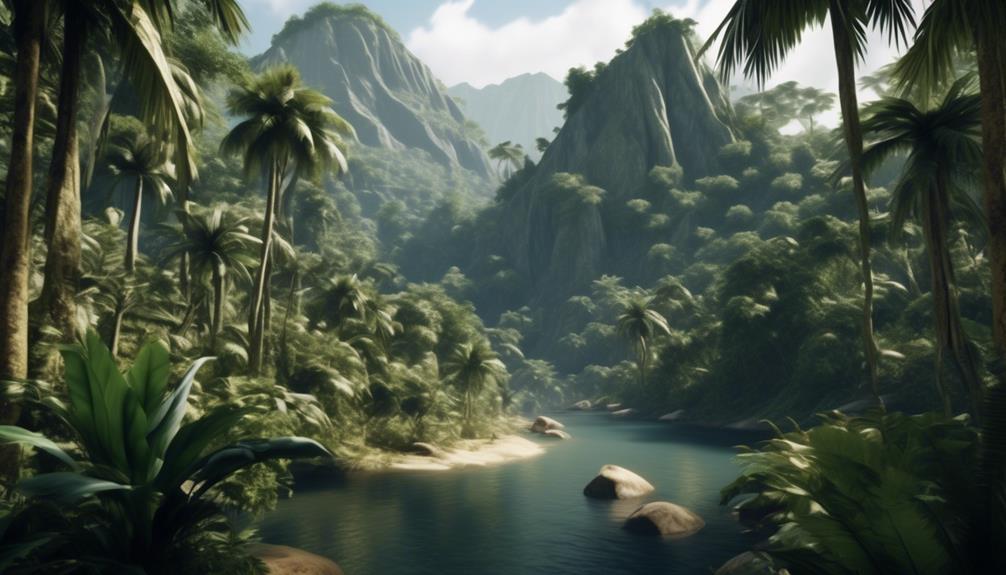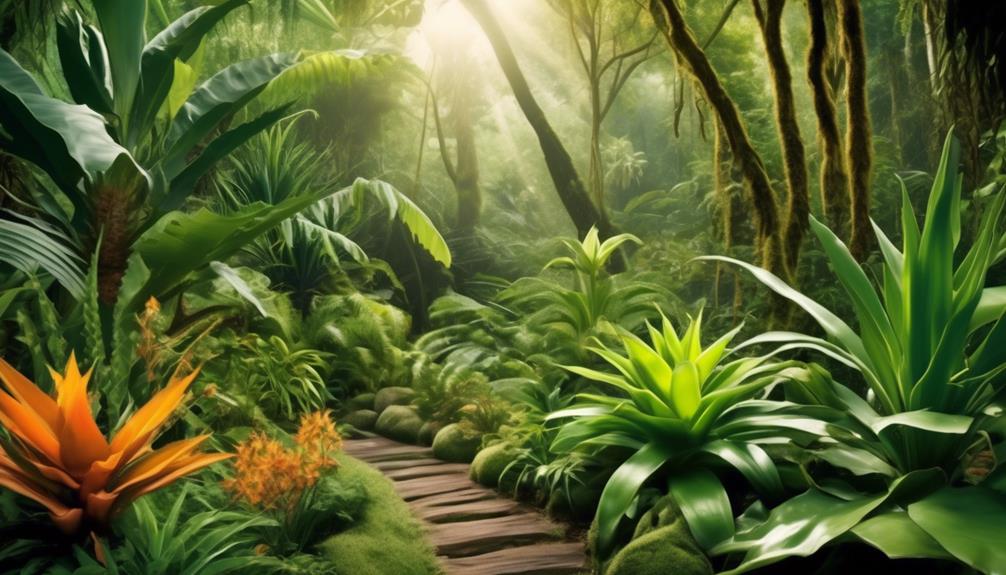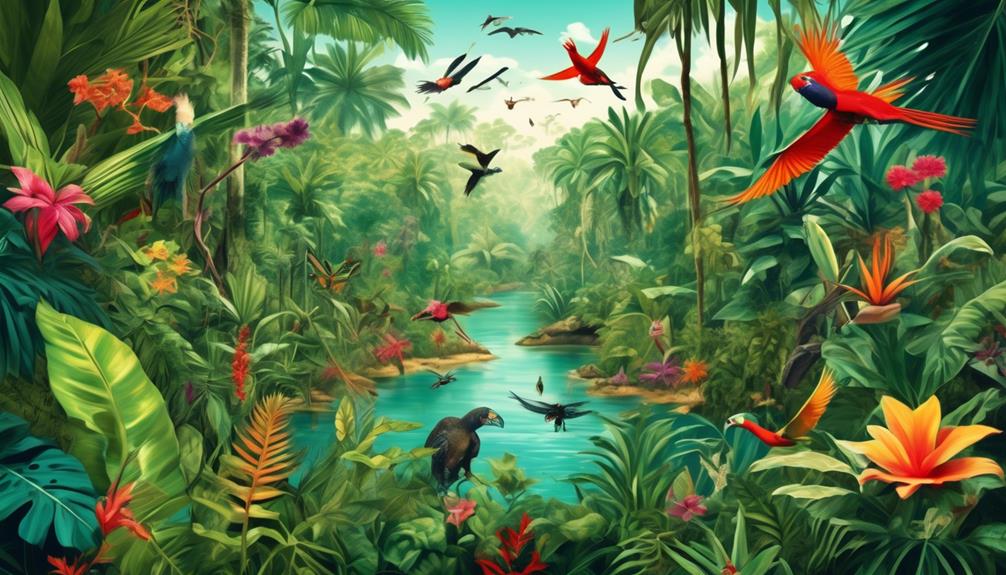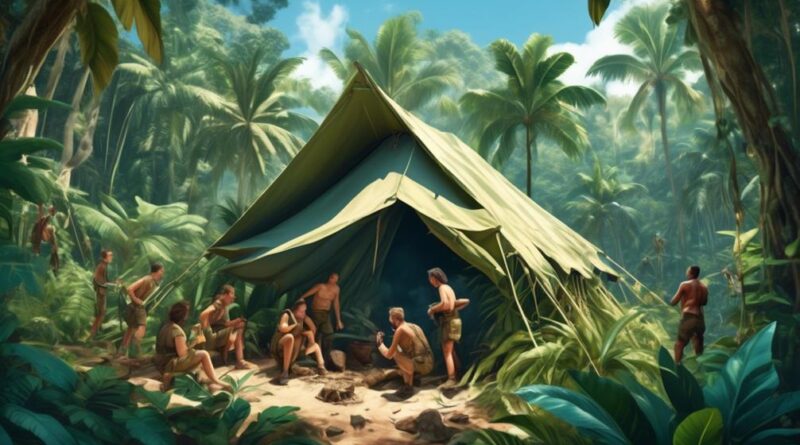Why Choose Tropical Locations for Survival Training Holidays?
When it comes to survival training, the saying 'adapt or perish' couldn't be more apt.
You might be wondering why tropical locations are the ideal choice for honing your survival skills. Well, picture this: lush rainforests, crystal-clear waters, and a myriad of challenges that will push your limits.
But that's just the beginning. There's a multitude of reasons why choosing a tropical location for your survival training holiday can provide you with an experience like no other.
Ideal Climate for Outdoor Training
When preparing for outdoor training, it's essential to seek out a climate that fosters physical endurance and mental resilience. Tropical locations provide an ideal setting for outdoor fitness and wilderness adventures. The warm temperatures and high humidity in tropical climates challenge your body, enhancing your physical endurance. The lush, diverse landscapes offer a perfect backdrop for wilderness adventures, pushing you to develop mental resilience in unfamiliar terrains.
Engaging in outdoor fitness in a tropical climate offers unique benefits. The warmth and humidity increase your heart rate and metabolism, promoting a more effective workout. Additionally, the varied terrain, such as tropical forests, beaches, and mountains, provides opportunities for diverse physical activities like hiking, swimming, and climbing. These activities not only build strength and stamina but also improve balance and agility due to the uneven and challenging surfaces typically found in tropical locations.
Embarking on a wilderness adventure in a tropical setting encourages mental resilience. Navigating through dense jungles or climbing steep volcanic slopes challenges your problem-solving skills and decision-making abilities. Moreover, exposure to unfamiliar wildlife and flora builds adaptability and mental fortitude. The unpredictable nature of tropical weather, including sudden rain showers or intense heat, demands quick thinking and adaptability, further strengthening your mental resilience.
Abundance of Edible Plants and Fruits
In a tropical climate, your outdoor training experience is enriched by the abundance of edible plants and fruits, providing opportunities for foraging and learning about sustainable nutrition. Edible plant foraging in tropical locations offers an immersive way to understand the diverse array of plant life that can be utilized for sustenance. You can learn to identify and safely gather a variety of edible plants, gaining valuable knowledge that can be applied in survival situations. This hands-on experience fosters a deeper connection to the natural environment and enhances your self-sufficiency skills.
Tropical fruit harvesting is another valuable aspect of survival training in these locations. The opportunity to learn about different tropical fruits, when they're ripe for picking, and how to safely consume them, adds a practical dimension to your training. You can discover the nutritional benefits of various fruits and gain insight into how they can contribute to a well-rounded diet in a survival scenario. Additionally, understanding the seasonal availability of different fruits equips you with essential knowledge for sustainable foraging and nourishment.
Engaging in edible plant foraging and tropical fruit harvesting not only enriches your outdoor training experience but also imparts valuable survival skills. The abundance of edible plants and fruits in tropical locations offers a multifaceted learning environment that combines practical nutrition with the thrill of exploration. By immersing yourself in foraging for sustenance, you gain a deeper appreciation for the resources provided by the natural world.
Diverse Terrain for Realistic Simulations

Exploring the varied terrain of tropical locations provides an ideal setting for immersive and realistic survival simulations. The diverse landscapes, ranging from dense rainforests to coastal areas, offer a multitude of realistic scenarios where survival skills practice becomes not just a learning experience, but an adventure.
In the dense rainforests, you can encounter challenging terrains such as thick vegetation, steep slopes, and limited visibility due to dense foliage. Navigating through this environment would require you to employ skills like orienteering, trailblazing, and shelter construction to mimic real-life survival situations. These scenarios push you to adapt to the surroundings, teaching you valuable lessons in resourcefulness and resilience.
Coastal areas in tropical locations present their own set of challenges, including potential hazards like strong tides, limited freshwater sources, and exposure to the elements. Learning to fish, build shelters using available materials, and purify water from the sea are crucial skills that can be honed in these environments. The dynamic nature of coastal terrains offers a different perspective on survival training, preparing you for a wider range of potential scenarios.
Opportunity to Learn Tropical Survival Skills
Amidst the diverse terrain of tropical locations, you have the prime opportunity to acquire essential survival skills tailored to real-world scenarios. Jungle trekking in tropical environments provides an unparalleled chance to learn navigation through dense vegetation, identifying edible plants, and understanding the behavior of local wildlife. The intricate network of trails and hidden paths allows you to develop crucial skills in orienteering and map reading, vital for survival in unfamiliar territories.
Moreover, shelter building in tropical settings is a fundamental skill that can be honed during survival training holidays. The abundance of natural resources, such as palm leaves and bamboo, facilitates learning how to construct sturdy and weather-resistant shelters. Understanding the principles of shelter construction in these settings is invaluable, as it prepares you to adapt to different climates and terrains, ensuring your safety and well-being in challenging circumstances.
Introduction to Tropical Medicinal Plants

Discover the diverse array of tropical medicinal plants that can be utilized for survival and wellness in the wild. Tropical regions are rich in traditional remedies and herbal medicine, making them a fascinating classroom for learning about the healing properties of plants. Plant identification and foraging techniques are essential skills for anyone seeking to harness the medicinal power of the natural world.
Traditional remedies derived from tropical medicinal plants have been used for centuries by indigenous communities to treat a wide range of ailments. Through hands-on experience, you can learn to identify and responsibly harvest these plants, gaining valuable knowledge that could prove vital in a survival situation. Understanding the properties and uses of different plants can provide you with a natural pharmacy in the wild, offering remedies for anything from cuts and burns to digestive issues and infections.
Herbal medicine from tropical plants has also gained attention in modern wellness practices, with many of these plants being incorporated into alternative and holistic treatments. By delving into the world of tropical medicinal plants, you can expand your understanding of natural remedies and gain insight into the sustainable use of plant resources. Learning about these plants not only equips you with survival skills but also fosters a deeper appreciation for the natural world and its healing capabilities.
Immersion in Local Indigenous Survival Techniques
Immerse yourself in the local indigenous survival techniques to gain firsthand knowledge and practical skills for thriving in challenging environments. One of the most valuable aspects of survival training in tropical locations is the opportunity to learn from local indigenous communities. These communities have developed time-tested techniques for thriving in the wilderness, and by immersing yourself in their tribal traditions, you can gain a deeper understanding of how to survive and thrive in the tropics.
Local foraging is a fundamental skill that you can learn from indigenous communities. These communities have a wealth of knowledge about the edible plants, fruits, and roots that can be found in the tropical landscape. By learning from them, you can discover which plants are safe to eat, how to identify them, and how to prepare them for consumption. This knowledge can be invaluable in a survival situation, where access to food may be limited.
Additionally, tribal traditions often include techniques for building shelters, starting fires, and navigating the terrain. By participating in these traditions, you can learn practical skills that have been honed over generations. For example, you may learn how to construct a shelter using natural materials found in the environment or how to start a fire without modern tools.
Unique Wildlife and Navigation Challenges

When navigating tropical locations for survival training, you'll encounter unique wildlife that presents both challenges and opportunities for learning.
The diverse range of wildlife in tropical areas can pose navigation obstacles, but it also provides a chance to develop valuable survival skills. From venomous snakes to elusive big cats, encountering wildlife in its natural habitat can be both exhilarating and daunting. Learning how to navigate around these creatures safely is an essential part of survival training in tropical locations.
Wildlife encounters can serve as valuable lessons in navigation. For instance, tracking the movements of animals can provide insights into finding sources of water and identifying safe areas for shelter. Understanding the behavior of wildlife can also aid in predicting potential dangers and adjusting your navigation route accordingly. Moreover, spotting specific types of birds or insects can indicate the proximity of certain resources, such as fruit-bearing trees or freshwater streams.
Additionally, navigating through dense vegetation and unfamiliar terrain in tropical environments can present its own set of challenges. Learning to read the signs of the natural world, like broken foliage or animal trails, becomes crucial for successful navigation. This type of training can enhance your ability to adapt and thrive in diverse and unpredictable environments.
Cultural Exchange and Community Engagement
Engaging with local communities during survival training in tropical locations offers a unique opportunity to learn about diverse cultures and gain valuable insights into traditional survival techniques. Cultural immersion becomes an integral part of the experience, allowing you to interact with indigenous communities and learn from their time-tested methods for thriving in the natural environment. This form of community building fosters mutual respect and understanding, creating a platform for meaningful cultural exchange.
By engaging with local communities, you not only gain practical skills but also develop a deep appreciation for different ways of life. Immersing yourself in the customs and traditions of the local people provides a rich learning experience that goes beyond survival training. You'll have the chance to witness age-old practices firsthand, such as foraging for food, building shelters, and navigating the terrain, all of which are deeply rooted in the culture of the region. This cultural exchange can be incredibly enriching, broadening your perspective and fostering a sense of global interconnectedness.
Furthermore, community engagement during survival training holidays often leads to meaningful connections and friendships that transcend cultural boundaries. Working alongside locals to learn about their survival techniques creates a sense of camaraderie and shared experience, strengthening the bond between participants and the community. This not only enhances the overall training experience but also contributes to sustainable and responsible tourism practices, as it fosters positive relationships between visitors and the local inhabitants.
Frequently Asked Questions
What Are the Specific Safety Measures in Place for Dealing With Potential Tropical Hazards Such as Extreme Weather, Dangerous Wildlife, and Tropical Diseases?
When planning your trip, safety measures are a top priority. Emergency response plans are in place for dealing with potential tropical hazards, such as extreme weather, dangerous wildlife, and tropical diseases, ensuring a secure and enjoyable experience.
Are There Any Specific Language or Cultural Barriers That Participants Should Be Aware of When Engaging With Local Indigenous Communities During the Training Program?
When engaging with local indigenous communities during the training program, cultural sensitivity is crucial. Be aware of language barriers and show respect for their customs. Understanding and acknowledging their cultural practices will enhance your experience.
How Does the Program Address the Ethical Considerations of Using Indigenous Survival Techniques and Medicinal Plants for Training Purposes?
When you join the program, ethical considerations are carefully addressed in the use of indigenous techniques and medicinal plants for training purposes. The program ensures respectful and responsible engagement with local indigenous communities.
What Kind of Support and Resources Are Available for Participants With Limited Outdoor or Survival Experience to Ensure They Can Fully Participate in the Program?
If you have limited outdoor experience, the survival program provides participant support and resources to ensure you can fully participate. The program offers training and guidance to help you navigate the challenges of a tropical environment.
Can Participants Expect to Learn About and Practice Specific Skills Such as Building Shelters, Finding and Purifying Water, and Navigating in Tropical Environments?
In a tropical environment training, you'll learn building shelters, foraging for food, wilderness first aid, and outdoor survival techniques. The program covers survival skills, emergency preparedness, and tropical survival training, ensuring a comprehensive wilderness survival program.
Conclusion
So, when you're considering a survival training holiday, think about the benefits of choosing a tropical location.
You'll have the ideal climate for outdoor training, an abundance of edible plants and fruits, diverse terrain for realistic simulations, and the opportunity to learn tropical survival skills and medicinal plants.
Plus, you'll immerse yourself in local indigenous techniques, unique wildlife and navigation challenges, and engage with the local community.
It's a truly immersive and enriching experience!
